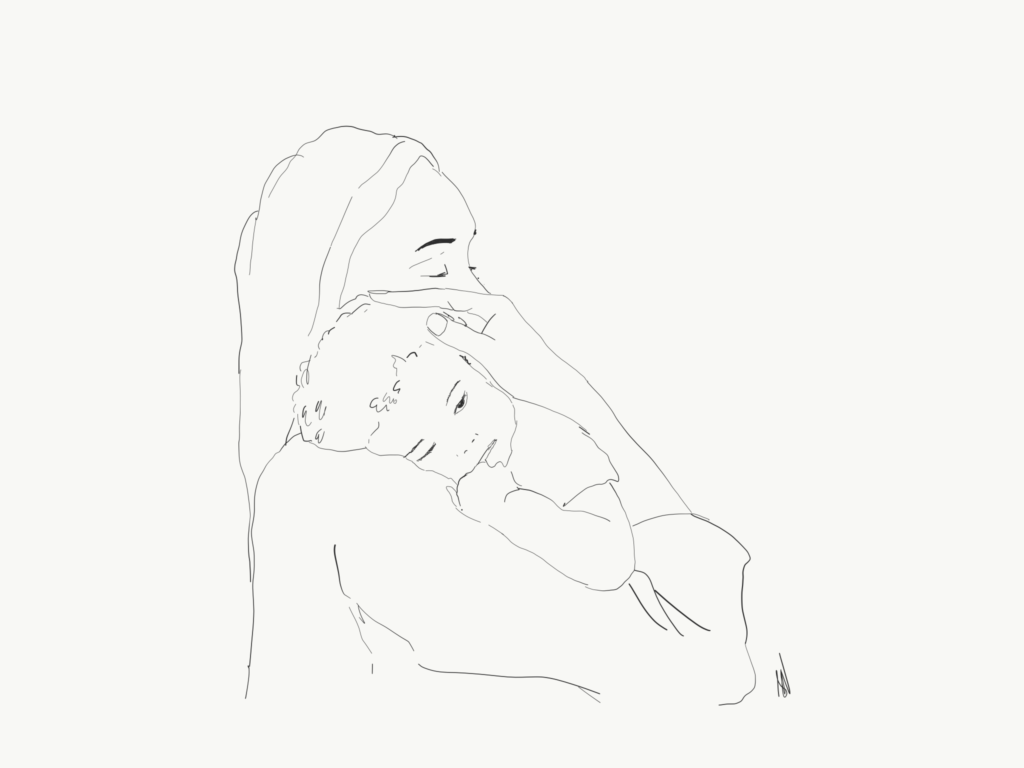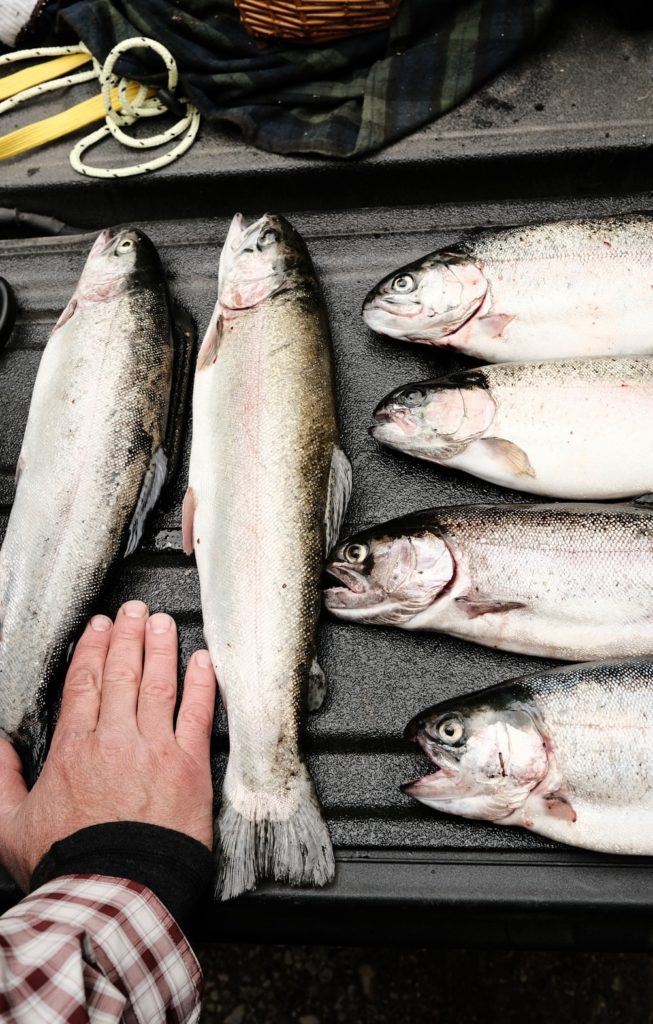In the delivery room, she lay there centre stage, under the unforgiving glare of fluorescent lights.
Her legs splayed apart like a fork in the road. (Such a lady.) She was dismayed by trail of red stretch marks across her stomach, and the cellulite dimples on her pale thighs.
Stretch marks and hail damaged thighs—some celebrity, she couldn’t remember had said—‘Embrace them, they’re the song lines of your life’. Song lines? Song lines? Her body was a wreck, and it would never ever be the same again.
Kelly shrugged at the indignity of exposing her private parts to the parade of midwives and doctors that ducked in and out of the delivery room.
What did it matter now in her 15th hour of labour?
Pethidine made her feel intellectually numb, and dumb. She was trippin’. And it only knocked the pain off by a fraction.
Kelly stared at the apex of her belly, which was morphing again, its landscape shifting the hills and valleys. The rough ripples under the surface of her skin frightened her. Was there a litter of puppies in there instead?
They’d lied about the 24 hour protection from her Rexona Sport deodorant. The flavour of her armpits was making her gag a little. The top of her head was sticky with damp matted hair.
She hoped that other liquids or possible solids (heaven forbid) didn’t squirt from her southern orifices. She’d read about it, how the pressure from pushing could lead to such messes. Uggh.
The waves of pain were intensifying, narrowing in, and becoming more frequent now. Kelly prayed, ‘Lord let this be it. Please, please, please God.’
The midwife leaned into her ear. ‘Now, Kelly I want you to push. Give it all you’ve got.’
Her body split in two. She rode the charge, the monstrous wave, the mother of all contractions. She bent her knees upward. With every cell in her body she bore down, curling her body.
Eyes shut, pressure on, heat searing her veins. Her head felt as if it was going to pop right off into the stratosphere.
Blinding white light.
Kelly’s fingers clenched and her toes dug in deep on the mattress. Kelly heard a strange husky voice, low and throaty demanding, ‘Get this thing outta me, now.’ And then realized it was her own.
Kelly screamed until the paint curdled and bubbled off the hospital walls.
Then deep inside she felt the sweeping whoosh of pressure. A release. Something escaped. The midwife wrestled something slippery right from under her.
Another scream. It wasn’t Kelly’s, but the first cry of her beautiful baby girl.
Right before her eyes, the midwife began haphazardly sprinkling her baby’s entire body with salt.
Hang on a minute. The drugs were making her hallucinate, Kelly thought.
Why was this midwife treating her newborn like a lovely piece of pork belly?

****
In modern day hospitals, the salting of a baby just doesn’t happen. However, in Ezekiel 16:4 babies were rubbed in salt for good health.
Soranus of Ephesus, a Greek obstetrician who practiced in first century Alexandria and Rome, recommended sprinkling babies with powdery salt as a cleansing agent.
The salt would cut through birth residue and placental remains on the newborn’s skin.
Jesus said that Christians are the salt of the earth.
Ye are the salt of the earth:but if the salt have lost his savour, wherewith shall it be salted? It is thenceforth good for nothing, but to be cast out, and to be trodden under foot of men. Matt 5:13
Salt is a disinfectant.
If we’re doing our job, we help keep our culture clean by living our lives to the highest moral standards.
With the Holy Spirit’s guidance we can promote physical, spiritual and emotional healing. Clean environments also prevent the spread of harmful bacteria. Especially for those who have been wounded by the world’s degenerative influence.
Just think of Christians who are helping others recover from substance abuse, or running soup kitchens to feed the poor, or are caring for foster kids.
They’re salt of the earth.
Salt is a preservative.
In the late 1800’s, a sailor on Captain James Cook’s vessel—The Endeavour—would receive two kilograms of salt beef and one kilogram of salt pork as part of his weekly rations.
Prior to the days of refrigeration, salting meat was a common practice. Salt rubbed into meat or fish prevents food from rotting. The salt arrests the microorganism that causes the spoilage, from multiplying.
Our Christian influence should help preserve society from falling deeper into corruption and immorality.
Just reading or watching the news highlights how far our society has slipped. We find hardworking people swindled of their life savings, egregious crimes on the vulnerable, elderly folk bashed and robbed, and mutilated bodies discovered in bushland.
We need to preserve God’s standards on the earth.

Salt is a seasoning.
Salt enhances the flavour of meals. It makes food even more delicious and appetizing.
As believers, we should be enriching other people’s lives. Do we bless others in our day-to-day conversations and interactions? Do others feel and know the love of Christ just by being with us? I hope so.
We must exercise caution though. Too much salt is unpleasant to taste. So don’t dump a heap of it, just sprinkle it on with the right touch.
As Christians, we should make others thirsty for the God we claim to love and serve. Why? Because our lives are consistently honouring Jesus.
Can salt lose its flavour?
Salt or sodium chloride is a very stable chemical compound. In reality, it never loses its flavour or saltiness.
So what did Jesus mean when he said salt could lose its flavour?
During the time of Christ, it required considerable effort to separate the impurities and sand from the salt extracted from the Dead Sea.
The salt, which people used, was not chemically pure. It could be diluted or contaminated with sand and grit. It would result in a product that was meant to be salt but didn’t taste like salt.
Believers must lead holy lives to keep the full of flavour of Christ and his teachings. We must lead lives of purity. We can’t allow our salt to be polluted with the world’s sand.
Otherwise, we’ll lose our impact and become good for nothing.
Get out of the saltshaker.
The world needs our salt. Just look around you, morals are disintegrating before our eyes.
We can’t distance ourselves so much from the world that we’re oblivious to this erosion. By the same token, we can’t absorb the world’s value system or the ways in which it operates.
Be good and do good, for we are the salt of the earth.
Bibliography
Author unspecified. ‘What does Matthew 5:13 mean?’, Bibleref.com. Retrieved 10 May 2021 from
https://www.bibleref.com/Matthew/5/Matthew-5-13.html
Author unspecified. ‘Food and Rations’, Sea Museum. Retrieved 10 May 2021 from
Evins, K. 2013, I didn’t know that comes from the Bible, Freeman Smith. Tennessee.
Henry, M. 1961, Commentary on the Whole Bible, Zondervan, Michigan.
Hayes, C. 2021, ‘What Does Matthew 5:13 mean by ‘Salt of the Earth’?’, Crosswalk.com. Retrieved 10 May 2021 from
https://www.crosswalk.com/faith/bible-study/what-does-matthew-5-mean-by-salt-of-the-earth.html
Hendren, M. 2013, ‘Birth and Salt’, WomenfromtheBookBlog.com. Retrieved 10 May from
https://womenfromthebook.com/tag/salting-a-newborn/
Pfeiffer C,F. 1990, The Wycliffe Bible Commentary, Moody Publishers, Illinois.
Swindoll, C. 1991, Simple Faith, Word Publishing. Nashville.
Walton, J. 2000, The IVP Bible Background Commentary Old Testament, IVP Academic, Illinois.



Very good analogies.
Cheers:)
Miss!!!! You’ve scarred me from having kids!! ????????
It was really creative how you turned salting a baby into a lesson. I loved it ❤️
Keep making amazing posts
Just have kids anyway, even if it is scary. It’s totally worth it.